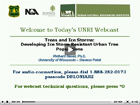Management – Improved Approaches – Forest Pests
Effects of Urban Forests and their Management on Human Health and Environmental Quality
The long-range goal of this scientific research, which includes work undertaken by UNRI scientists at the Northeast Center for Forest Health Research, in Hamden, CT, is to understand the role that insects have in maintaining healthy forest ecosystems and to improve the sustainability of forest ecosystems by mitigating the effects of insects that impact forest health. Biological control research in this work unit has for many years focused on investigating the biology, behavior, and host interactions of established parasites, predators, and pathogens of the gypsy moth. This, together with extensive studies on the biology and population dynamics of the gypsy moth itself, forms a broad base of knowledge that is now being used to investigate and develop new approaches in biological control of the Asian gypsy moth and other newly introduced pests such as the hemlock woolly adelgid.
Please visit the Northeast Center for Forest Health Research for detailed information on the scope of projects that are currently being undertaken by the research team and their cooperating partners.


